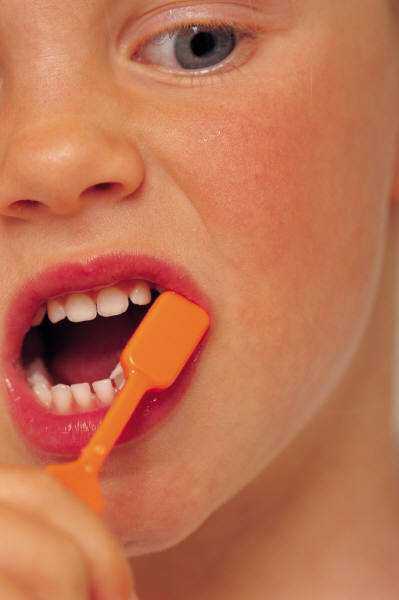 Sodium Fluoride, Triclosan (a pesticide according to the EPA!), Sodium Lauryl Sulfate, Propylene Glycol.
Sodium Fluoride, Triclosan (a pesticide according to the EPA!), Sodium Lauryl Sulfate, Propylene Glycol.
These are the common ingredients in your tube of toothpaste. None of them are good for you, your gums, your liver or your pearly whites.
Lately, I’ve received inquiries from folks who are looking for effective and safe toothpastes to use while taking their remedies.
Let me share with you what I personally use and what anyone else can try!
Not only is this toothpaste safe to take when using homeopathic remedies (remember, mint can be an antidote to homeopathic remedies), it is also far safer for the entire body than most products on the market today.
And it's inexpensive to boot! I also like the idea that moms can make these kinds of products at home with their children in order to teach them the importance of self reliance.
Here’s what you do:
Mix together the following ingredients:
I keep my toothpowder in a pretty porcelain cup.
To use this mixture, just wet your brush and dip it into the toothpowder. In essence, you are cleaning the brush; the mechanics of the brush are what really clean your teeth.
Important note: Because baking soda is an abrasive, using too much can be detrimental, so a very little goes a long way. If you have too much powder on your brush it can be too abrasive and remove the dentin.
 I am a homeopath with a worldwide practice working with families and individuals via Zoom. I'm also a teacher and most importantly, a mom who raised my now-adult children depending on homeopathy over the last 31 years. I lived decades of my life with food intolerances, allergies, and chemical sensitivities until I was cured with homeopathy, so I understand pain, anxiety, and suffering. You may feel that your issues are more severe or different than anyone else’s, but I have seen it all in my practice and in my work in India. My opinion is that nothing has come close to the reproducible, safe and effective results that my clients, students and I have achieved with homeopathy.
I am a homeopath with a worldwide practice working with families and individuals via Zoom. I'm also a teacher and most importantly, a mom who raised my now-adult children depending on homeopathy over the last 31 years. I lived decades of my life with food intolerances, allergies, and chemical sensitivities until I was cured with homeopathy, so I understand pain, anxiety, and suffering. You may feel that your issues are more severe or different than anyone else’s, but I have seen it all in my practice and in my work in India. My opinion is that nothing has come close to the reproducible, safe and effective results that my clients, students and I have achieved with homeopathy.
Call today and learn how homeopathy might just be the missing piece in your health strategy.
Joette is not a physician and the relationship between Joette and her clients is not of prescriber and patient, but as educator and client. It is fully the client's choice whether or not to take advantage of the information Joette presents. Homeopathy doesn't "treat" an illness; it addresses the entire person as a matter of wholeness that is an educational process, not a medical one. Joette believes that the advice and diagnosis of a physician is often in order.
We've provided links for your convenience but we do not receive any remuneration nor affiliation in payment from your purchase.
The Author disclaims all liability for any loss or risk, personal or otherwise incurred as a consequence of use of any material in this article. This information is not a substitute for professional medical advice, diagnosis or treatment.
I generally use baking powder straight. I’ve also had a piece of previously filled tooth break off. Perhaps, but not absolutely certain, the full sterength baking soda contributed. I have clay powders, maybe even French, which I’ll add to see how that works. Besides preference in taste, what would you say are other factors one might consider in choosing the particular oils?
I’ve also added a little coconut oil at times to make a paste. What pros or cons do you see in that?
Thanks for letting us all know just how strong baking soda can be! I recommend trying out the French clay sometime. Cinnamon, clove, fennel and anise oils are my first choices because they are particularly beneficial to dentistry. For example, cinnamon is antimicrobial, clove oil is a natural analgaesic and antiseptic; anise and fennel oils are both antiseptic.
Correction: baking SODA, not powder.
I want to try the cinnamon flavor – it sounds great! You’re so right about cinnamon tooth pastes having mint! Sneaky buggers.
Yes, instead of reading all that fine print-just make your own!
Does the French Clay have to a food grade? I can’t find food grade French Clay.
Yes, the French Clay should be food grade-I’ve found mine in local natural food stores.
Thanks, Joette! It’s about time I try making some of this tooth cleaning powder. I have sensitive teeth and dipping in plain baking soda is too tongue-numbing and harsh…I brush hard as it is; yet I can’t seem to stop unless my teeth feel clean. I’ll give this a try!
I hope you like it!
Thanks! I am always on the lookout for a good toothpaste. But I do have a questions about the essential oils. A friend gave me a starter kit, but I have been hesitant to use them because of their strong odors. I was afraid they would antidote my remedies. What are your thoughts on that?
Because you will end up using a very small amount of the essential oil for the homemade toothpowder, I wouldn’t worry about antidoting the remedies, especially if the oils used are those mentioned in the article (Steer clear of all mint oils and eucalyptus though!)
Would bentonite clay work instead of french clay? There was a mistake in my ordering and I ended up with 2 bags of bentonite instead of 1 with a bag of french clay. Now I’m looking for ways to use up that second bag.
Yes, you could use that.
I used cinnamon and baking soda my teeth became very sensitive what can I use never had this problem before
THere is evidence offered by Dr. Weston Price, a dentist who did a great deal of research on dental caries and formation of the mouth that toothpaste and such is actually unnecessary when diet is pure. Indeed, a tooth brush that is cleaned with peroxide, backing soda, salt, etc. can be a tool that is mechanically effective regardless of what is applied to the bristles before brushing.
First of all, thanks for all your invaluable advice!
I’d like to give the baking soda+clay mix a try. How often may I brush my teeth with this mix?
Another question: is this suitable for small children (4 years old boy)?
For most, I imagine brushing teeth twice daily is the norm. Remember that baking soda is abrasive so too much can erode the teeth. Having said this, my grandparents used this method and had no problems as have I for over 35 years. SO far, so good.
I taught my children to do the same from the time they began to brush.
Another homemade DIY recipe from an online dentist actually discourages using ANY essential oils because of their noted antibacterial qualities. He points out that EO can disrupt the bacteria make-up necessary in our mouths. Interesting to research /consider that caveat. Thanks for your tips, Joette. Always good to have on hand something simple and practical.
Joette, this sounds lovely! I’ll be making some today. What about a good mouthwash? What do you recommend/use yourself?
Using vaking soda has proven to erode tooth enamel. Isn’t it dangerous to be used daily. Once in a while it is ok.
Who funded the “proof”? I’ve been using it for over 40 years…daily.
Who funded the “proof”? I’ve been using it for over 40 years…daily.